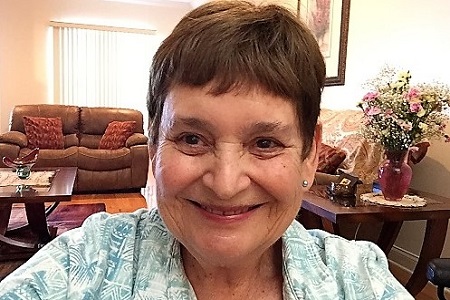
Adjusting to our new normal includes finding different ways to connect with family and friends during this time.
By Patricia Levinson Communications Chair for Hadassah International.
This Shabbat felt strange. It is the first, I suspect of many, when my husband Lionel and I will be alone in our apartment in Florida, carefully observing voluntary isolation and social separation.
 Around us the natural world has not changed. The plants on my balcony are blooming. The osprey chic is still cheeping in its nest a few feet from my front door while its parents rush to feed it. The cordoned-off beautiful white beaches three miles from my home are the domain of the gulls. Below my balcony the wild birds that feed on our pond are still there every day: herons, ducks, Canadian scout geese, roseate spoonbills and ibis pecking for grubs and crustacea.
Around us the natural world has not changed. The plants on my balcony are blooming. The osprey chic is still cheeping in its nest a few feet from my front door while its parents rush to feed it. The cordoned-off beautiful white beaches three miles from my home are the domain of the gulls. Below my balcony the wild birds that feed on our pond are still there every day: herons, ducks, Canadian scout geese, roseate spoonbills and ibis pecking for grubs and crustacea.
For us humans, the world has changed dramatically. In January, Lionel and I cancelled a cruise that was due to leave from Singapore in March. Ever since then we have watched the coronavirus make its impact in country after country.
As a couple, we have been making our preparations for the inevitable. However, having the internet available is a gamechanger as we face this epidemic. Isolation and social separation are no longer absolute when you can talk to your family, interact with community and participate in society via the internet.
This Shabbat we faced the indefinite closure of our synagogue’s doors to all community activities. Live streaming Friday night Shabbat services from an empty sanctuary does allow worshipers to participate in the service, but it is a poor substitute at best. We have lost the essential social component of Shabbat, the opportunity to get together with family and friends. I am also not sure how you count an online minyan – a quorum of ten worshipers – essential for those of us who want to say the Kaddish prayer to observe the anniversary of the death of a loved one. Judaism relies on community to mark all essential rites of passage.
Friday morning, I finally took some time off from my Hadassah volunteer work to pick through my carefully stashed food supply to see what I could use to prepare Shabbat dinner. My priority was to use the fresh foods first—they will not last. I can use the frozen and canned goods later. I decided on a steak from my freezer, small potatoes that were already starting to sprout, and some fresh green beans I picked up at the supermarket last week. That was my last trip to buy groceries for a while. From now on we will depend on delivery services from our local supermarket.
Checking out the Pesach supplies that I had bought several weeks ago, now arranged on a special shelf in my laundry, I also ruminated about the meaning of Pesach at a time such as this. How will we celebrate the holiday when we cannot be with family and friends? What will the Seder look like?
Dealing with this modern plague has given me a fresh appreciation for the biblical plagues we commemorate each year. Egypt was the America of its time. A sophisticated advanced society that was a leader in its world. Imagine the shock to the economy from each of the plagues? Should we be writing a “Drash” – an interpretation — about the final plague, the killing of the first born? Does our recent experience tell us that maybe it should be read as “the killing of those born first” – the oldest?
Whether you believe literally in the Biblical stories or view them as legends about major events that occurred in the ancient world, Jews commemorate them as events that had a major impact on us as a people.
We are living through such an event right now. In the future, modern history will be divided into the epoch before the coronavirus (BC), and after the coronavirus (AC). We will tell our children that we lived through an unimaginable period that changed the world as we knew it.
Isolation notwithstanding, this has been an incredibly busy week for me as a Hadassah volunteer. I am deeply involved with Hadassah communications as one of the two volunteer Coordinators of the National Hadassah Marketing and Communications Division in New York. I also serve as the Hadassah International Communications Chair, dealing with all the communications that go out across the world from Hadassah International.
After weeks of preparation, this was the week that the Hadassah Hospitals in Jerusalem started to receive and treat their first coronavirus patients. Working from home, the members of the communications teams have dramatically ramped up their workload so that we can share some of the incredible Hadassah medical stories that are coming out of this crisis.
We in Hadassah are doing what we can to make the future that eventually emerges a positive one. I am so proud to be able to give back to society by volunteering for Hadassah. Once this devastation is over, we hope that we can say with pride that we had the power to heal our world, and that we worked together to make it happen.
This article appeared in Thrive Global on March 27, 2020 https://thriveglobal.com/stories/shabbat-coronavirus-pandemic-community-gathering-virtual-hadassah/
